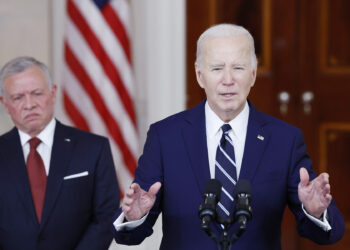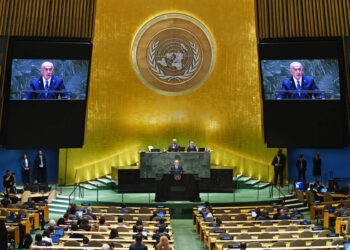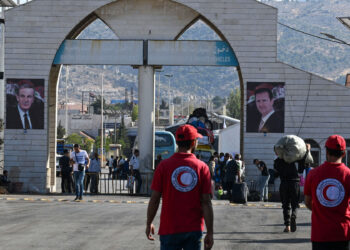Basil Alrafaih is a Jordanian journalist based in Virginia. Follow him on Twitter @basilrafayeh.
عربي
Imagine ending up in prison, and spending months in solitary confinement, just for posting a picture on your Facebook page. What if you protested your poor conditions in jail by going on hunger strike for days or even weeks, but your detention just went on, without a trial or any of the basic rights of political detainees?
This is what human rights activist Ahmed Tabanja al-Kinani was going through for nearly a year in Jordan, before he was released on bail late last month. His release was a surprise, and came just days before King Abdullah II left Jordan for a three-week visit to the United States, where he will be the first Arab leader to meet with President Joe Biden at the White House on July 19.
The arrest of al-Kinani, along with more than 1,000 teachers, activists, academics and journalists last year, reflects how tightly human rights have been restricted in Jordan, one of America's closest allies in the Middle East. Al-Kinani was one of thousands of Jordanians who supported demonstrations by teachers calling for better living conditions. While at a march in the city of Irbid in northern Jordan in August 2020, he took a photo of a policeman trying to pull a phone out of the hand of a teacher who was filming the protest. Al-Kinani later posted that photo on his Facebook page. The next day, the police raided his home and arrested him.
It was the second time that al-Kinani had been arrested, for the same offense. The authorities arrested him in March 2019, when he was using his phone to live stream protests by unemployed Jordanians in front of the royal court compound in Amman. He was released days later, but then arrested again for posts he had written on Facebook. He was accused of "insulting an official agency." As Human Rights Watch noted in a report that included details of his 2019 detention, "Jordanian authorities have increasingly targeted political and anti-corruption activists, on charges that violate the right to free expression."
The COVID-19 pandemic brought new emergency measures that Jordan's government has exploited against activists, government critics and the press, which culminated in the forced closure last summer of the 130,000-member Teachers Syndicate, the country's largest independent trade union. The repression has only continued. In recent weeks, Jordan arrested the deputy head of the Teachers Syndicate, Nasser al-Nawasrah, and several other members for planning a march in solidarity with other teachers forced into early retirement. But political life in the kingdom was already being stifled by the security services well before the arrival of COVID-19.
Now, this is all happening against the backdrop of instability in the monarchy and open disagreements within the ruling family. In April, the government accused Prince Hamzah bin al-Hussein—the half-brother of King Abdullah and the former crown prince—and several other high-profile figures of plotting to "destabilize the monarchy's security." Prince Hamzah was placed under house arrest. Two of those detained over the alleged plot—Bassem Awadallah, the former head of the royal court, and Sharif Hassan bin Zaid, a member of the royal family—were put on trial for sedition in late June. Both men were sentenced to 15 years in prison this week.
The charges that al-Kinani himself faces—of "inciting actions that would cause sedition and disturb public order" and "offending Arab countries"—are part of Jordan's sweeping anti-terrorism law. Those accused of such charges are tried before the State Security Court, which is still supposed to hear al-Kinani's case after his release on bail.
Few details are known about the cases of other political activists and government critics swept up in the arrests last year. Outside of the state-owned media, Jordan's small, independent press is restricted by continuous judicial orders that prevent publication of anything deemed "anti-government." Several laws are also designed to suppress freedom of opinion and expression, including the penal code, the anti-terrorism law, the cybercrimes law, and the law on public assembly.
Families of detainees have also become more reluctant and cautious to post on social media, due to harassment by the security services. The only recourse many Jordanians have is to file a complaint with the government-run National Center for Human Rights, like Ahmed al-Kinani did. As he found out, that often goes nowhere.
Given the closure of the Teachers Syndicate last year, and the arrest of its leaders and hundreds of its members and supporters, it is little surprise that the Economist Intelligence Unit's Democracy Index ranks Jordan as an authoritarian state, and that Jordan slid from "Partly Free" to "Not Free" in Freedom House's latest Freedom in the World report.
Jordanian authorities view the Teachers Syndicate as an unwanted aspect of the Arab Spring. They were forced into permitting its establishment under the pressure of mass protests in 2011, which notably called for "reform" in Jordan, not "the fall of the regime," unlike in Egypt, Tunisia, Syria, Libya and Yemen.
Since then, the Teachers Syndicate has challenged the government publicly and pushed for better working conditions. In 2019, teachers went on strike for a month, demanding the implementation of a 50 percent salary increase, which the government had promised in 2014. The average salary of a teacher in Jordan's public schools is about $500 per month, roughly equal to the poverty line in Jordan. Teachers in private schools make even less, usually no more than $200 a month, in the absence of effective government oversight over the working conditions of teachers in the private sector.
Despite previously agreeing to the Teachers Syndicate's demands for higher wages, the government then suspended them last year because of the economic crisis that resulted from COVID-19. Many teachers considered that a way for the government to reverse its pledge. The government in turn has accused the Teachers Syndicate of exploiting demands for better working conditions to achieve a wider political agenda. Some of the members of the Teachers Syndicate are affiliated with the Muslim Brotherhood, whose branch in Jordan was closed down by a judicial order last year.
The crackdown on the Teachers Syndicate has extended deeper into Jordanian political life, with widespread arrests and trials of academics, dissidents and social media activists who supported the teachers' demands. Despite the fact that parliamentary elections were held last year in the midst of the pandemic, the voter turnout was just 29 percent.
In this atmosphere, King Abdullah is now bringing supposed ideas of political reform to Washington. He recently ordered the formation of a 92-member royal committee to "modernize the legislative system," chaired by former Prime Minister Samir al-Rifai. It is tasked with proposing new laws on elections and political parties.
The United States is Jordan's single largest source of bilateral assistance, providing about $1.5 billion in aid to the kingdom each year. Because of Jordan's stifling economic crisis resulting from the pandemic, the unemployment rate in the first quarter this year was 25 percent, and as high as 50 percent for Jordanian youth. Foreign debt is now more than $37 billion, equivalent to 85 percent of Jordan's GDP.
Yet there are few expectations that Biden will pressure King Abdullah on human rights and political freedoms when they meet in the White House, or link America's ongoing economic aid to progress on those fronts. Meanwhile, Ahmed al-Kinani and hundreds of other Jordanian activists who have been detained in successive crackdowns will continue to wait for fundamental reforms that would grant them their basic political rights, including freedom of opinion, as stipulated in Jordan's constitution.
![]()








